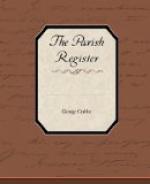The angry Matron grew for contest ripe.
“Can you,” she said, “ungrateful and unjust,
Before experience, ostentation trust!
What is your hazard, foolish daughters, tell?
If safe, you’re certain; if secure, you’re well:
That I have luck must friend and foe confess,
And what’s good judgment but a lucky guess?
He boasts, but what he can do: —will you run
From me, your friend! who, all lie boasts, have done?
By proud and learned words his powers are known;
By healthy boys and handsome girls my own:
Wives! fathers! children! by my help you live;
Has this pale Doctor more than life to give?
No stunted cripple hops the village round;
Your hands are active and your heads are sound;
My lads are all your fields and flocks require;
My lasses all those sturdy lads admire.
Can this proud leech, with all his boasted skill,
Amend the soul or body, wit or will?
Does he for courts the sons of farmers frame,
Or make the daughter differ from the dame?
Or, whom he brings into this world of woe,
Prepares he them their part to undergo?
If not, this stranger from your doors repel,
And be content to be and to be well.”
She spake; but, ah! with words too strong and plain;
Her warmth offended, and her truth was vain:
The many left her, and the friendly few,
If never colder, yet they older grew;
Till, unemploy’d, she felt her spirits droop,
And took, insidious aid! th’ inspiring cup;
Grew poor and peevish as her powers decay’d,
And propp’d the tottering frame with stronger aid,
Then died! I saw our careful swains convey,
From this our changeful world, the Matron’s clay,
Who to this world, at least, with equal care,
Brought them its changes, good and ill, to share.
Now to his grave was Roger Cuff conveyed,
And strong resentment’s lingering spirit laid.
Shipwreck’d in youth, he home return’d, and found
His brethren three—and thrice they wish’d him drown’d.
“Is this a landsman’s love? Be certain then,
“We part for ever!”—and they cried, “Amen!”
His words were truth’s:- Some forty summers fled,
His brethren died; his kin supposed him dead:
Three nephews these, one sprightly niece, and one,
Less near in blood—they call’d him surly John;
He work’d in woods apart from all his kind,
Fierce were his looks and moody was his mind.
For home the sailor now began to sigh:-
“The dogs are dead, and I’ll return and die;
When all I have, my gains, in years of care,
The younger Cuffs with kinder souls shall share —
Yet hold! I’m rich;—with one consent they’ll say,
‘You’re welcome, Uncle, as the flowers in May.’
No; I’ll disguise me, be in tatters dress’d,
And best befriend the lads who treat me best.”
Now all his kindred,—neither rich nor poor, —
Kept the wolf want some distance from the door.
In piteous plight he knock’d
“Can you,” she said, “ungrateful and unjust,
Before experience, ostentation trust!
What is your hazard, foolish daughters, tell?
If safe, you’re certain; if secure, you’re well:
That I have luck must friend and foe confess,
And what’s good judgment but a lucky guess?
He boasts, but what he can do: —will you run
From me, your friend! who, all lie boasts, have done?
By proud and learned words his powers are known;
By healthy boys and handsome girls my own:
Wives! fathers! children! by my help you live;
Has this pale Doctor more than life to give?
No stunted cripple hops the village round;
Your hands are active and your heads are sound;
My lads are all your fields and flocks require;
My lasses all those sturdy lads admire.
Can this proud leech, with all his boasted skill,
Amend the soul or body, wit or will?
Does he for courts the sons of farmers frame,
Or make the daughter differ from the dame?
Or, whom he brings into this world of woe,
Prepares he them their part to undergo?
If not, this stranger from your doors repel,
And be content to be and to be well.”
She spake; but, ah! with words too strong and plain;
Her warmth offended, and her truth was vain:
The many left her, and the friendly few,
If never colder, yet they older grew;
Till, unemploy’d, she felt her spirits droop,
And took, insidious aid! th’ inspiring cup;
Grew poor and peevish as her powers decay’d,
And propp’d the tottering frame with stronger aid,
Then died! I saw our careful swains convey,
From this our changeful world, the Matron’s clay,
Who to this world, at least, with equal care,
Brought them its changes, good and ill, to share.
Now to his grave was Roger Cuff conveyed,
And strong resentment’s lingering spirit laid.
Shipwreck’d in youth, he home return’d, and found
His brethren three—and thrice they wish’d him drown’d.
“Is this a landsman’s love? Be certain then,
“We part for ever!”—and they cried, “Amen!”
His words were truth’s:- Some forty summers fled,
His brethren died; his kin supposed him dead:
Three nephews these, one sprightly niece, and one,
Less near in blood—they call’d him surly John;
He work’d in woods apart from all his kind,
Fierce were his looks and moody was his mind.
For home the sailor now began to sigh:-
“The dogs are dead, and I’ll return and die;
When all I have, my gains, in years of care,
The younger Cuffs with kinder souls shall share —
Yet hold! I’m rich;—with one consent they’ll say,
‘You’re welcome, Uncle, as the flowers in May.’
No; I’ll disguise me, be in tatters dress’d,
And best befriend the lads who treat me best.”
Now all his kindred,—neither rich nor poor, —
Kept the wolf want some distance from the door.
In piteous plight he knock’d




